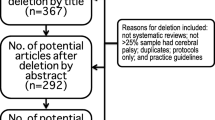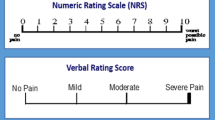Abstract
We retrospectively evaluated 118 patients with cervical dystonia (CD) treated with botulinum toxin type A (BTX-A) for the following variables: gender, age at evaluation, age at symptom onset, disease duration, presence of head/neck pain and/or tremor, pattern of head deviation, disease progression (spreading of symptoms), etiology (primary vs. secondary), pretreatment with oral medication, and Tsui score. We investigated whether these parameters could predict the clinical outcome in a short- (<30 days) and long-term basis. On short-term treatment, there were no clinically significant differences between BTX-A responsive and non-responsive patients. On long-term treatment, however, intake of oral medication previously to BTX-A injection and higher Tsui scores were predictors of favorable response. These results suggest that the greater CD severity the more likely patients will respond to BTX-A.
Similar content being viewed by others
References
Boccagni C, Carpaneto J, Micera S et al (2008) Motion analysis in cervical dystonia. Neurol Sci 29:375–381
Skogseid IM, Roislien J, Claussen B et al (2005) Long-term botulinum toxin increases employment rate in patients with cervical dystonia. Mov Disord 20:1604–1609
Truong D, Duane DD, Jankovic J et al (2005) Efficacy and safety of botulinum type A toxin (Dysport) in cervical dystonia: results of the first US randomized, double-blind, placebo-controlled study. Mov Disord 20:783–791
Jankovic J, Schwartz KS (1991) Clinical correlates of response to botulinum toxin injections. Arch Neurol 48:1253–1256
Haussermann P, Marczoch S, Klinger C et al (2004) Long-term follow-up of cervical dystonia patients treated with botulinum toxin type A. Mov Disord 19:303–308
Tsui JKC, Eisen A, Stoessl AJ et al (1986) Double-blind study of botulinum toxin in spasmodic torticollis. Lancet 2:245–247
Jankovic J (2004) Treatment of cervical dystonia with botulinum toxin. Mov Disord 19:109–115
Comella CL (2008) The treatment of cervical dystonia with botulinum toxins. J Neural Transm 15:579–583
Tarsy D (1997) Comparison of clinical rating scales in treatment of cervical dystonia with botulinum toxin. Mov Disord 12:100–102
Pal PK, Samii A, Schulzer M et al (2000) Head tremor in cervical dystonia. Can J Neurol Sci 27:137–142
Molho E, Feustel PJ, Factor SA (1998) Clinical comparison of tardive and idiopathic dystonia. Mov Disord 13:486–489
Papapetropoulos S, Baez S, Zitser J et al (2008) Retrocollis: classification, clinical phenotype, treatment outcomes and risk factors. Eur Neurol 59:71–75
Dressler D (2004) Clinical presentation and management of antibody-induced failure of botulinum toxin therapy. Mov Disord 19:92–100
Kessler KR, Skutta M, Benecke R (1999) Long-term treatment of cervical dystonia with botulinum toxin type A: efficacy, safety, and antibody frequency. J Neurol 246:265–274
Skogseid IM, Kerty E (2005) The course of cervical dystonia and patient satisfaction with long-term botulinum toxin A treatment. Eur J Neurol 12:163–170
Conflict of interest statement
The authors certify that there is no actual or potential conflict of interests involving this article.
Author information
Authors and Affiliations
Corresponding author
Rights and permissions
About this article
Cite this article
Felicio, A.C., Godeiro-Junior, C., de Carvalho Aguiar, P. et al. Predictable variables for short- and long-term botulinum toxin treatment response in patients with cervical dystonia. Neurol Sci 30, 291–294 (2009). https://doi.org/10.1007/s10072-009-0097-8
Received:
Accepted:
Published:
Issue Date:
DOI: https://doi.org/10.1007/s10072-009-0097-8




